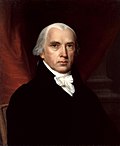Seventh Amendment to the United States Constitution
| This article is part of a series on the |
| Constitution of the United States of America |
|---|
 |
| Preamble and Articles of the Constitution |
| Amendments to the Constitution |
|
|
| Proposed Amendments |
| History |
| Full text of the Constitution and Amendments |
The Seventh Amendment (Amendment VII) to the United States Constitution is part of the Bill of Rights. This amendment codifies the right to a jury trial in certain civil cases.[a] It also stops courts from overturning a jury's verdict. The Seventh Amendment's provision for jury trials in civil cases has never been incorporated (applied to the states).[2] However, the rights to civil jury trials are found in nearly every state constitution.[2]
The prohibition of overturning a jury's verdict applies to federal cases, state cases involving federal law, and to review of state cases by federal courts.[3] United States v. Wonson (1812) established the "historical test", which interpreted the amendment as relying on English common law to determine whether a jury trial was necessary in a civil lawsuit. The amendment thus does not guarantee trial by jury in cases under maritime law, in lawsuits against the government itself, and for many parts of patent claims. In all other cases, the jury can be waived by consent of the parties. The amendment also guarantees a minimum of six members for a jury in a civil trial.[4]
Text
| “ | In Suits at common law, where the value in controversy shall exceed twenty dollars, the right of trial by jury shall be preserved, and no fact tried by a jury, shall be otherwise re-examined in any Court of the United States, than according to the rules of the common law.[5] | ” |
Background
The 7th Amendment was ratified on December 15, 1791 as one of ten amendments in the Bill of Rights.[6] But the background for its passing began in England during the 12th century.[6] At the time juries were made up of 12 men who gave their opinions in a trial. The 12-man jury originally included the accusers against the defendant, a supposed enemy of the king.[6] Eventually this led to a system where the jury made a verdict based on evidence.[6] The practice followed English colonists to the American colonies. But juries became a tool used to express American discontent with British rule. A series of Navigation Acts prohibited the American colonies from trading directly with the Netherlands, Spain, France, and their colonies.[6] As more and more trade restriction were imposed, the American colonists turned to smuggling.[6] When smugglers were caught, they were brought before juries made up of other colonists. These sympathetic juries often acquitted their fellow colonists.[6] The king, angered at these lawbreakers going free, created new courts that did not allow juries.[6] This was a breach of common law practice and infringed on their rights as British citizens. After the American Revolutionary War, the Seventh Amendment was written to expressly limit the powers of the executive and the Judicial branches of the new federal government.[6]
Seventh Amendment To The United States Constitution Media
The Bill of Rights in the National Archives
James Madison, drafter of the Bill of Rights
Justice Joseph Story issued the first judicial opinion on the amendment in United States v. Wonson (1812).
Notes
- ↑ The right to a jury trial in civil cases is found in the United States but in very few other places. England, Canada, Australia and New Zealand have all but done away with civil jury trials in favor of bench trials.[1] Fewer than 1 percent of civil trials in the US are jury trials.[2]
References
- ↑ Renee Lettow Lerner (29 May 2015). "The uncivil jury, part 5: What to do now — repeal and redesign". The Washington Post. Retrieved 15 February 2016.
- ↑ 2.0 2.1 2.2 "The Seventh Amendment". National Constitution Center. Archived from the original on 21 February 2016. Retrieved 15 February 2016.
- ↑ "The Justices v. Murray 76 U.S. 274 (1869)". Justia U.S. Supreme Court Center. Justia U.S. Supreme Court Center. Retrieved 16 February 2016.
- ↑ "Seventh Amendment". The Free Dictionary/Farlex. Retrieved 15 February 2016.
- ↑ United States Government Printing Office. "SEVENTH AMENDMENT ---- CIVIL TRIALS ---- CONTENTS" (PDF). gpo.gov.
- ↑ 6.0 6.1 6.2 6.3 6.4 6.5 6.6 6.7 6.8 "7th Amendment to the Constitution". totallyhistory.com. Retrieved 15 February 2016.


